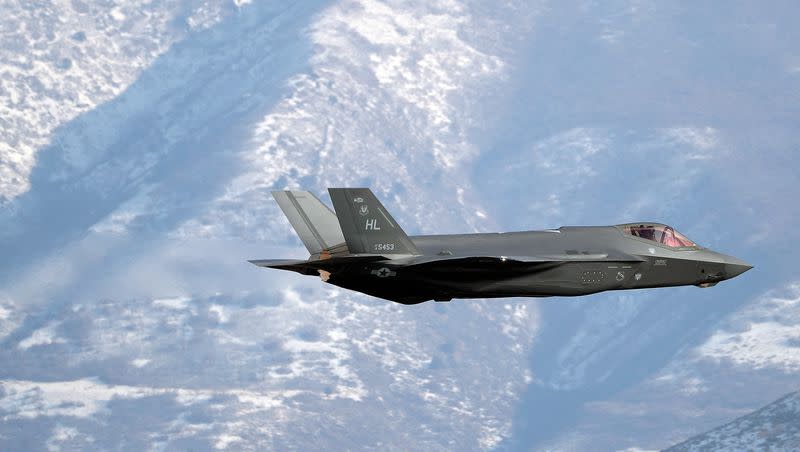Sen. Mitt Romney secures Utah-centric measures in defense spending bill

- Oops!Something went wrong.Please try again later.
The House voted Friday to pass a defense spending bill, authorizing over $875 million in spending over the next year. Meanwhile, the Senate has its own version of the bill, with a vote scheduled for next week.
The National Defense Authorization Act, NDAA, is typically advanced on a bipartisan basis each year, with the two chambers needing to come to a compromise once they both pass their versions of the bill, as Politico reported.
Sen. Mitt Romney, a Utah Republican, said he managed to secure a few measures that cater to the Beehive State’s priorities in the Senate’s version of the bill.
“With the growing threats the United States faces from our adversaries, it is vital that our military has the resources, equipment and capabilities it needs to keep our nation safe,” Romney said in a press release.
“I’m proud that this year’s Senate NDAA includes several provisions which I fought for to protect against these growing threats by modernizing our nuclear triad, fully understanding the extent of China’s defense-industrial complex, and bolstering our domestic critical mineral capabilities to reduce our dependence on China and Russia.”
Related
One of the measures includes a version of Romney’s Military Service Promotion Act of 2023. The legislation, cosponsored by Sen. Angus King, I-Maine, and Sen. Tom Cotton, R-Ark., addresses the recruitment crisis the military faces, which is also a priority for the Utah National Guard.
Current law requires high schools to give access to recruiters but Romney’s bill would enhance this access by requiring that recruiters receive a response to their requests within 60 days, and be given access to career fairs and student dropout information.
It also signals to the Department of Defense to expand the army’s Future Soldier Preparatory Course, which prepares prospective draftees for the required physical fitness and aptitude testing.
“Our military is facing the largest recruitment crisis in 50 years, which has real impacts on our national security,” Romney said.
The Army's recruitment fell by 25% — or roughly 15,000 soldiers — last year, creating the most challenging labor market since the service became an all-volunteer force in 1973, according to a report. Only 1% of the U.S. population currently serves, while 71% of American youth don’t qualify for reasons like physical and mental fitness, and aptitude.
The Army isn’t the only service struggling to prop up recruitment — the Marine Corps, Air Force and Navy face the same dilemma.
Another measure that made it into the NDAA draft bill is Romney’s Chemical and Biological Defense Program Improvement Act, which would allow the Army to fund chem-bio program facilities without any bureaucratic roadblocks. One such facility that would benefit is Utah’s Dugway Proving Ground.
Related
The act is co-sponsored by Romney and Utah’s entire Republican congressional delegation — Sen. Mike Lee, Rep. Chris Stewart, Rep. John Curtis, Rep. Burgess Owens and Rep. Blake Moore.
“Dugway Proving Ground (DPG) and its Chemical and Biological Defense mission are critical to U.S. readiness for the fights of the future,” said Lee. “Cutting bureaucratic red tape to request military construction funds alleviates an unnecessary burden and allows the hard-working men and women at Dugway to spend their time and talents on the core mission.”
Other measures supported by Romney that made it into the draft version of the bill include:
The Sentinel Nuclear Deterrence Act seeks to “provide multiyear procurement authority for LGM-35A Sentinel intercontinental ballistic missiles, help to stabilize key supply chains, and increase program efficiency.”
The Critical Mineral Independence Act of 2023 will “push the Department of Defense to achieve critical mineral supply chain independence from China, Russia, and other geostrategic competitors and adversaries.”
The China Defense Spending Transparency Act will require “the Defense Intelligence Agency to publish a comprehensive report exposing the true extent of China’s defense-industrial build up.”

